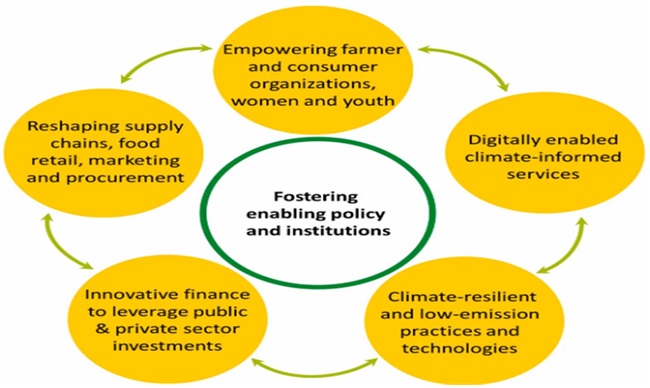| (Mains, General Studies Paper- 3: Environmental Impact Assessment, Food Safety Related Issues, Supply Chain Management) |
Reference
Climate change has significantly affected agriculture and aquatic food production around the world. To cope with this, important strategies and practices are needed to develop resilient food systems, which can ensure sustainability and food security for future generations.
Impact of climate change on food systems
- Development of adverse conditions: Climate change has caused deterioration in soil quality, rainfall patterns, pest management, seasonal growth cycles, land erosion and biodiversity.
- New problems: Due to climate change, crops and their products are facing the problem of various diseases and pests. Due to the use of excessive chemicals in their management, new diseases, pollution, superbugs etc. are arising.

- Increase in disasters: Climate change has increased the frequency and intensity of climate-related events such as droughts, floods and heat waves. In view of this, there is an urgent need to modify food systems to improve climate resilience.
- Introduction of new species: Due to climate change, other species are widely used in place of native species, which affects the local biodiversity and ecosystem.
- In developing countries where nutritional deficiencies are prevalent and rain-fed agriculture is preferred, the links between climate change and food security are becoming increasingly evident.
Challenges facing climate-resilient food systems
- Small and marginal farmers have limited access to finance and technology
- Lack of awareness and capacity among stakeholders
- Competing land-use priorities
- Policy gaps at national and global level
Measures needed to develop climate-resilient food systems
Adopting sustainable agricultural practices
- A key strategy for developing climate-resilient food systems is the adoption of sustainable agricultural practices.
- This approach includes techniques such as crop rotation, polyculture and cover cropping that improve soil health and reduce susceptibility to pests and diseases.
- Agroecology: It promotes biodiversity and ecosystem services by incorporating ecological principles into farming practices.
- Conservation Agriculture: It emphasizes on maintaining soil cover, reducing soil degradation and diversity in plant species.
- Conservation agriculture improves soil structure, increasing its water retention capacity and increasing resilience to climate extremes.
- Organic Agriculture: It avoids the use of synthetic or artificial inputs and focuses on natural processes that support soil fertility and ecosystem health.
- This makes it a sustainable option for climate resilience.
Crop and Animal Diversity
- Another important strategy to increase resilience is to diversify crops and livestock. Climate change can alter patterns of pests and diseases, making monocultures particularly susceptible.
- Diversified agricultural systems include different types of crops and livestock breeds, which help reduce risks.
- Crop diversification reduces the risk of total crop failure and can increase overall agricultural productivity.
- Climate-resilient crop varieties and breeds are better adapted to withstand extreme weather conditions such as heat, drought and floods.
- Diversified agricultural systems help maintain productivity under changing climate conditions, ensuring a sustainable food supply, according to a study from sub-Saharan Africa.
Efficient water management
- Efficient water management methods like drip irrigation reduce water wastage by delivering water directly to the roots of plants.
- Rainwater harvesting is an effective method for use during dry periods.
Use of climate-smart technologies
- It is important to use climate-smart technologies to modernise agricultural practices and increase resilience.
- Precision agriculture, remote sensing and data analytics enable farmers to make informed decisions, optimise resource use and increase productivity.
- Mobile apps and digital tools provide real-time weather forecasts, pest alerts and best practice recommendations, helping farmers adapt to changing conditions.
- Precision agriculture uses GPS and sensors to monitor crop health, soil conditions and weather patterns, allowing farmers to use inputs such as water, fertilizers and pesticides more efficiently.
- Remote sensing techniques such as satellite imagery help in monitoring large areas, early identification of stress signals and mitigating potential damage.
Enhancing socio-economic resilience in disadvantaged groups
- These mainly include:
- Providing access to climate information and early warning systems
- improve market access and value chains
- Implementing social safety nets and insurance schemes for farmers
- Empowering local communities
- Promoting inclusive economic growth
Encouragement of innovation
- Research and development in areas such as climate-resilient crop varieties, bio-fortification, sustainable aquaculture and alternative protein sources through innovation are critical to address food security challenges in a changing climate.
- Advances in digital agriculture, block chain technology and data analytics also offer new opportunities to improve resilience and transparency in food supply chains.
Effective policy and governance framework
- Effective policy and governance frameworks are essential to advance the transformation of food systems towards climate resilience. This mainly includes the following points
- Integrating climate change considerations into agricultural policies
- Promoting sustainable land use planning
- Encouraging climate-smart practices through subsidies and incentives
- Promoting international cooperation and exchange of knowledge
- Collaboration between governments, civil society, the private sector and research institutions is key to implementing holistic and inclusive strategies.
Way Forward
- Making food systems climate resilient is relatively complex. It requires a combination of adaptive agricultural practices, technological innovation, social and economic empowerment, biodiversity conservation and effective governance.
- Addressing these challenges and seizing opportunities can lead to the development of resilient food systems that ensure food security, protect natural resources and promote sustainable development for future generations.



